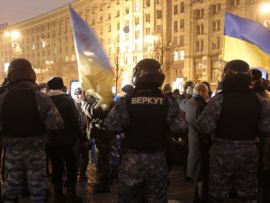Court bans on peaceful gatherings more and more frequent

Over the last year there has been a significant increase in the number of court rulings prohibiting peaceful protests. In fact, Roman Kuybida from the Centre for Political and Legal Reform notes, in Kyiv courts have begun allowing ALL applications from the Kyiv City State Administration. This is seen in a study the Centre carried out into rulings restricting the right to peaceful assembly issued by administrative courts at all levels. has increased significantly
Roman Kuybida adds that the right to peaceful assembly is infringed by bodies of local self-government , as well as by the courts who apply Soviet legislation and local bodies’ subordinate acts which are in breach of the Constitution.
He points out that all such cases have good prospects of success in the European Court of Human Rights.
Other infringements to the right of peaceful assembly are seen where the police and courts charge the organizers of peaceful gatherings with “unauthorized” meetings. Only the court can ban a peaceful gathering. “”We see that the courts are not familiar with European standards, including European Court of Human Rights judgements, the OSCE guiding principles on freedom of peaceful assembly. Or perhaps they consciously ignore them.” Most courts, right up to the High Administrative Court, use the Decree of the Presidium of the USSR (this decree from 28 July 1988 «On the procedure for the organization of meetings, political rallies, street events and demonstrations in the USSR” stipulates that applications must be given 10 days in advance. The very title makes it clear how extraordinary its use by courts in independent Ukraine is – translator), as well as acts issued by bodies of local self-government restricting freedom of assembly.
Roman Kuybida cites the most common grounds given for court bans. These are that they would coincide with official events or events of other organizations (typically that there might be conflict between them – translator); niggles over the notification; notification not given with enough time; restrictions to traffic. He points out that these do not meet European standards. For example, the likelihood of counter-demonstrations cannot be used as an excuse for banning a demonstration.
During a meeting on Thursday between representatives of the OSCE and Venice Commission and Ukrainian NGOs, the issue of proper legislation was discussed. The Committee on Strengthening Democracy and Affirming the Rule of Law under the President back in June approved a new draft law on freedom of peaceful assembly and sent it to the Venice Commission. On 14 October the Venice Commission and OSCE made public their Joint Opinion on the draft law.
Roman Kuybida is convinced that this law is vital in order to prevent arbitrary restrictions by the authorities of peaceful assembly and bring Ukraine into line with European standards.
Abridged from the report at http://dw-world.de/dw/article/0, , 15507977, 00.html






